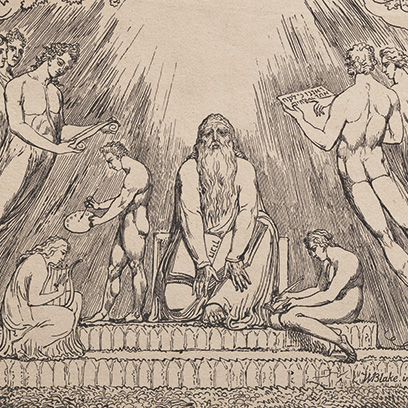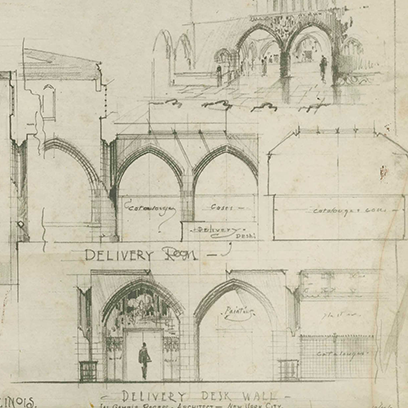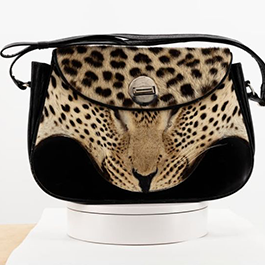
Herskovits Library of African Studies
Curated by Arianna Ray, PhD candidate
An American's Africa explores what we can learn from the items collected during a journey. In 1953, Lydia Luhman Pederson, a white woman from Rockford, Illinois, went to Africa for two months. Years later, her film footage, scrapbook of pictures and receipts, and an assortment of souvenirs were donated to the Herskovits Library at Northwestern University. Looking through these items offers us a glimpse of the history of tourism and of Africa as seen through Lydia's eyes.
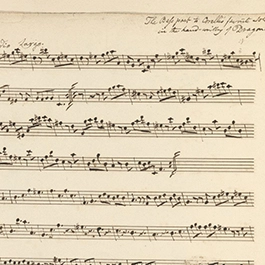
Music Library
Domenico Carlo Maria Dragonetti (1763 -1846) is well-known to bassists in the world of classical music. Perhaps the fist “rock star” of the double bass, his career had a profound influence on the development of the instrument in terms of technique, repertoire, and status. Digital Dragonetti explores the life and career of this important musician by highlighting primary source materials contained in the Hans Moldenhauer Collection.
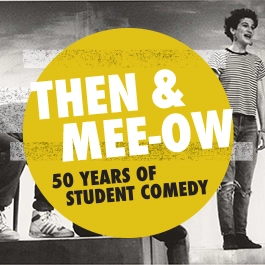
McCormick Library of Special Collections and University Archives
In 1973, a pair of satire-minded undergraduates put a finger into the establishment eye by mounting an eclectic creation named, with winking irreverence, “the Mee-Ow Show.” Half a century later, Mee-Ow is an annual fixture, known for its mix of comedic skits, improv, and house bands. Relive 50 years of comedy history in this retrospective of the Mee-Ow Show.
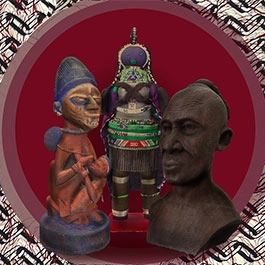
Herskovits Library of African Studies
Curated by Craig Stevens, archaeology PhD student
Augmented Curiosities engages our technological entanglements through the emerging, immersive and experiential visualization techniques of Augmented Reality (AR) and Virtual Reality (VR). Critiquing the colonial dynamics of the “cabinets of curiosity” which significantly influenced Western museum practices, Augmented Curiosities provides opportunities for intimate and playful interactions with African material culture from the Herskovits Library Collection.
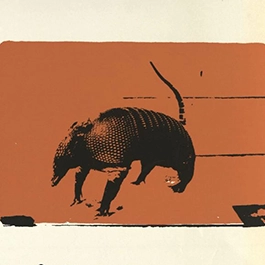
McCormick Library of Special Collections and University Archives
Curated by Ben Taylor
From costumed May Day pageants in Deering Meadow to free-form Armadillo Day festivals with student-designed entertainment, celebrations by Northwestern students to mark the end of the school year have taken many forms. Since the 19th century these events have reflected the social realities and campus concerns of their times. Looking back at the history of May celebrations, change and renewal may be its own form of tradition.
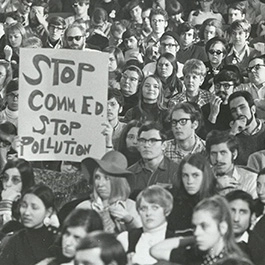
McCormick Library of Special Collections and University Archives
Curated by Ben Taylor
Before the first Earth Day in April 1970 and amid new coordination on college campuses nationwide, Northwestern held the first environmental “teach-out” on January 23: “Project Survival.” Organized by Northwestern Students for a Better Environment (NSBE), the all-night event was addressed to the campus, local community members, students from all over the midwest, and a national audience. Drawing from archival collections, this exhibit explores Project Survival as a complex event, its background and aftermath, how its message was presented and received.
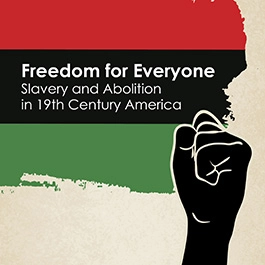
McCormick Library of Special Collections and University Archives and Herskovits Library of African Studies
Curated by Marquis Taylor, history PhD student
Juneteenth marks a ;momentous ;celebration ;— ;the end of American slavery — but it ;was ;not the end of the story about Black Americans’ struggle for freedom and ;equality. As Northwestern marks its first observance of the new federal holiday, we examine how deeply slavery was ingrained in 19th century America, how abolitionists forced a nation to face its inhumanity ;— and ;how that work must continue today. Juneteenth shows us that justice can prevail. But it must be fought for, even after it has been granted.
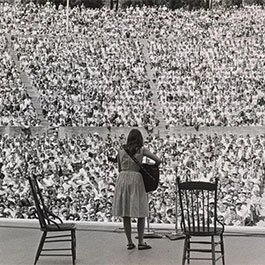
McCormick Library of Special Collections and University Archives
Curated by Dr. Michael J. Kramer
This exhibit presents the story of the Berkeley Folk Music Festival, which took place on the campus of the University of California between 1958 and 1970. The exhibit was curated from the Berkeley Folk Music Festival Archive, a repository of roughly 33,500 artifacts housed at Northwestern University Libraries and now fully digitized through a National Endowment for the Humanities Preservation and Access Grant. It raises important questions about race, class, gender, region, higher education, public space, cultural heritage, and the practice of American democracy during the decades after World War II.
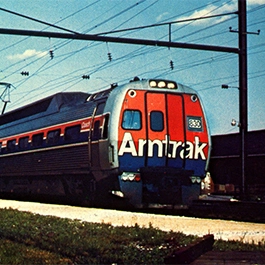
Transportation Library
A half century ago, the Rail Passenger Service Act of 1970 consolidated and restructured passenger rail service under a quasi-public corporation. On May 1, 1971, Amtrak went into service. In honor of Amtrak’s 50 anniversary, this exhibit looks back at highlights from the railroad’s history through passenger ephemera, reports, and other documents in the collections of Northwestern University’s Transportation Library.
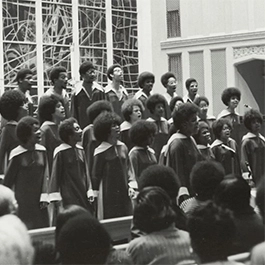
McCormick Library of Special Collections and University Archives
On May 8, 1971, Black Northwestern students founded Northwestern Community Ensemble (NCE), a student choral group grounded in the Black Christian music tradition, to provide students a spiritual outlet, to sing Black sacred music, and to foster community. This online exhibit examines first 10 years of the organization, using archival records and oral history interview clips.
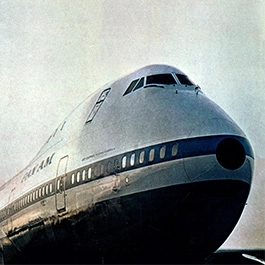
Transportation Library
Longer than the Wright brothers first flight, wider than a boulevard, and with a tail height as tall as a six-story building, the 747 was a revolution in aviation technology and the passenger experience when it entered service on January 22, 1970. The online exhibit The 747 Takes Off explores this plane's early days of flight.
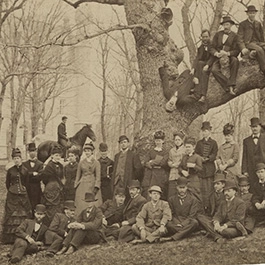
McCormick Library of Special Collections and University Archives
On June 23, 1869, the Board of Trustees recorded the decision to admit women to Northwestern: “Resolved that we approve of the admission of young women to the classes of the University upon the same terms and conditions as young men…” The path leading from that handwritten declaration to today was not simple nor immediate. The exhibition draws on University Archives to examine the twisty and tenuous path Northwestern took to educating college-age women.
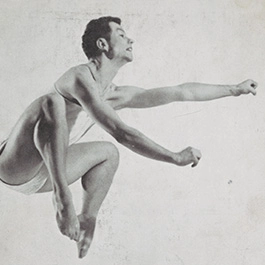
Music Library
John Cage, one of the most influential composers of the 20th century, shaped the avant garde music scene by introducing chance elements, performer preferences, and non-traditional instrumentation. His works are just as essential in the history of dance, where his collaborations with choreographers (including his life partner Merce Cunningham) became the accompaniment that strongly informed an era of experimentation. This exhibition draws on the John Cage collection to explore his impact on the history of dance.
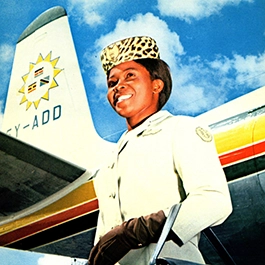
Transportation Library
This exhibit looks at the history of African airlines. As nations throughout Africa attained their independence in the 1960s and surrounding decades, the establishment of national airlines soon followed. These airlines served important functions in connecting regions underserved by rail and road infrastructure. Equally as important, they served as symbols of national identity, economic expansion, modernity, and technological advancement.
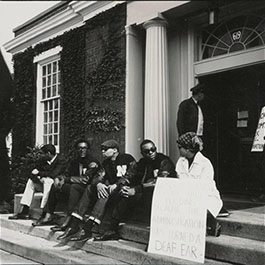
McCormick Library of Special Collections and University Archives
On April 22, 1968, members of Black student organizations, For Members Only (FMO) and Afro-American Student Union (AASU) presented a list of demands to the Northwestern administration in response to discriminatory campus policies and practices. When the demands were not met, approximately 120 African American students occupied the Bursar’s Office. After a 38-hour demonstration, Black students and University administration came to a resolution. This online exhibit tells the story of this transformative moment in Northwestern history.
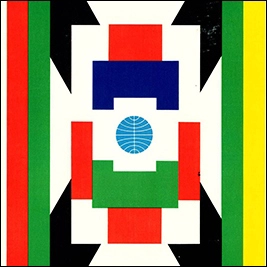
Transportation Library
The story of passenger transportation in the mid-20th century is one of shifting modes, new technologies, and intense innovation. New corporate identities, created by some of the leading designers of the day, provided a visible representation of the continually-evolving modernity of passenger transportation in the jet age. This exhibit highlights items from the Transportation Library's special and circulating collections, and highlights contributions of donors, whose collections are featured in the exhibit.
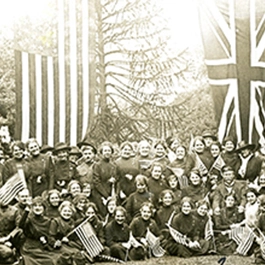
McCormick Library of Special Collections and University Archives
One hundred years after the U.S. entry into World War I, the Northwestern University Libraries look back at how the war shook this campus. In addition to artifacts commemorating fallen students and a series of wartime posters by the U.S. government, this exhibit includes a special focus on Northwestern’s own Base Hospital 12, a deployment of doctors and nurses drawn from the University and the Chicagoland area.
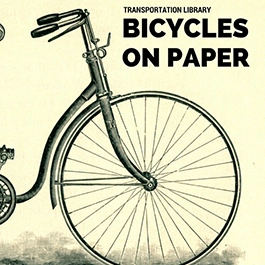
Transportation Library
As it is today, the bicycle at the turn of the 20th century was a form of transportation, recreation, amusement, and a creator of community. This exhibition looks at bicycles in all of these forms through printed matter in the collection of Northwestern University’s Transportation Library.
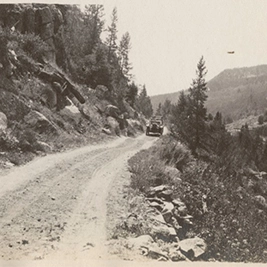
Transportation Library
In the spring of 1915, a group departed Iowa in a Model T for a journey to the Panama Pacific International Exhibition in San Francisco, with a turn off to the Colorado Loop along the way. Follow their cross-country journey through an online exhibit featuring photos from an album housed at Northwestern University's Transportation Library.
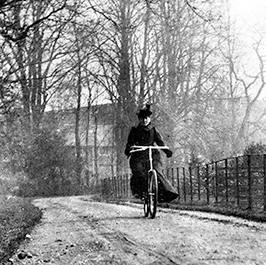
McCormick Library of Special Collections and University Archives
A chronological overview of Willard’s life, from her student days at the North Western Female College to her leadership role in the WCTU. This exhibit focuses on the complex ties between Willard and the “Classic Town” — Evanston— that helped shape her vision of the world and her role in it.
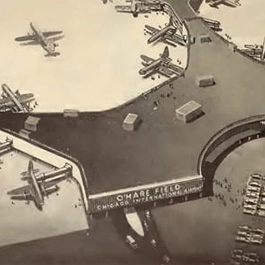
Transportation Library
On March 23, 1963, President John F. Kennedy officially dedicated O'Hare International Airport. Fifty years later, our beloved O'Hare is still going strong and has become a city and national transporation icon.
